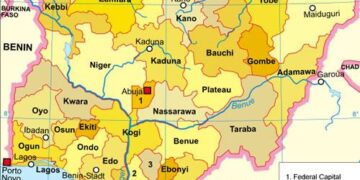Introduction:
Lassa fever, a viral hemorrhagic disease endemic to West Africa, has become a significant public health concern in Nigeria, where it frequently leads to outbreaks with alarming fatality rates. First identified in 1969, the disease is caused by the Lassa virus, primarily transmitted through contact with the urine or feces of infected Mastomys rats. In recent years, Nigeria has experienced a surge in reported cases, exacerbated by a complex interplay of ecological, social, and healthcare-related factors. The Lancet underscores the urgent need to address this health crisis, emphasizing the importance of timely surveillance, effective public health interventions, and community education to mitigate the impact of Lassa fever on vulnerable populations. As healthcare workers and government agencies grapple with containing the outbreaks, understanding the epidemiology and socio-cultural dynamics of Lassa fever remains critical to safeguarding health and preventing further loss of life. This article delves into the current state of Lassa fever in Nigeria, exploring its implications for public health policy and the ongoing efforts to combat this persistent threat.
Current Epidemiology of Lassa Fever in Nigeria
Lassa fever remains a significant public health challenge in Nigeria, characterized by its endemic nature and seasonality. Recent reports indicate a surge in cases, especially during the dry season, as the virus spreads from rodent reservoirs to humans. The current epidemiological landscape reveals a concerning trend, with over 1000 confirmed cases reported this year alone across various states. the most affected regions include:
- Ondo state – Notable for high transmission rates.
- Edo State – Continuously reporting outbreaks.
- Taraba State – Emerging as a new hotspot.
Healthcare response efforts are sustained by the Nigerian Center for Disease Control (NCDC), which collaborates with local health authorities to enhance surveillance and outbreak management. The integration of community awareness initiatives plays a pivotal role in early case detection and treatment, minimizing mortality rates. However, several challenges hinder effective containment:
- Inadequate healthcare infrastructure - Limited access to diagnostic facilities.
- Stigma associated with the disease – Deterring individuals from seeking medical help.
- Lack of adequate funding – Compounding prevention efforts.

Factors Contributing to the Spread of Lassa Fever
Lassa fever continues to pose significant health challenges in Nigeria, influenced by a multitude of interrelated factors. One primary contributor is environmental conditions that facilitate the proliferation of the mastomys rodent, the main carrier of the virus. Urbanization and deforestation have driven these rodents into closer contact with human populations, heightening the risk of transmission. Additionally,inadequate waste management practices create environments conducive to rodent habitation,ultimately facilitating the spread of the disease.
Furthermore, socioeconomic factors significantly exacerbate the situation. Limited access to healthcare services frequently enough results in delayed diagnosis and treatment, allowing the virus to spread undetected. Many communities lack knowlege about the disease, leading to ineffective preventive measures. additionally, cultural practices and behaviors, such as the consumption of bushmeat and improper food storage, can further heighten exposure risks. The confluence of these elements creates a challenging landscape for controlling Lassa fever outbreaks.

Impact of Lassa Fever on Public Health in Nigeria
Lassa fever poses a significant challenge to public health in Nigeria, where it is endemic.The disease, caused by the Lassa virus, primarily spread through contact with infected rodents, particularly the Mastomys natalensis, common in many rural and urban areas. Outbreaks frequently enough occur during the dry season and can strain healthcare systems already grappling with limited resources. Critical impacts include:
- Increased morbidity and mortality: The case fatality rate can reach up to 15%, particularly among patients with severe symptoms.
- Healthcare burden: Frequent outbreaks may lead to hospital overcrowding and increased pressure on medical personnel.
- Socio-economic implications: The fear of infection can disrupt economic activities, particularly in agricultural and local markets.
In response to these challenges, public health initiatives are vital for reducing the incidence and impact of the fever. strategies include heightened community awareness, enhancing laboratory capacity for rapid diagnosis, and establishing better surveillance systems. A collaborative effort between governmental and non-governmental organizations has become crucial in tackling the disease effectively.The table below summarizes key statistics related to Lassa fever in Nigeria:
| Year | Reported Cases | Fatalities | Geographical Spread |
|---|---|---|---|
| 2021 | 2,100 | 250 | 23 States |
| 2022 | 3,450 | 300 | 25 States |
| 2023 (Projected) | 4,000 | 350 | All regions |

Strategies for Prevention and Control of Lassa Fever
effective prevention and control of Lassa fever in Nigeria necessitates a multifaceted approach that incorporates public health education, hygiene practices, and community engagement. Key strategies include:
- Public Awareness Campaigns: Educating communities about the transmission of Lassa fever through rodent exposure and human contact.
- improved Sanitation: encouraging proper waste management and food storage to minimize rodent attraction.
- Health Surveillance: Implementing robust surveillance systems to quickly identify and respond to outbreaks.
- Access to Healthcare: Enhancing access to medical facilities for timely diagnosis and treatment of suspected cases.
Moreover, collaboration with local, national, and international health organizations is crucial in establishing an effective response framework. Considerable focus should also be placed on:
- Research and Progress: Investing in research for vaccines and medications to combat Lassa fever.
- Rodent Control Measures: Implementing ecological approaches to manage and reduce rodent populations in inhabited areas.
- Training Healthcare Workers: Equipping medical personnel with the knowledge and skills to identify and treat Lassa fever effectively.
| Strategy | Description |
|---|---|
| Public Awareness | Educating populations on risk factors and prevention methods. |
| Rodent control | Implementing community measures to manage rodent habitats. |
| Healthcare Access | Providing timely diagnosis and treatment options for communities. |
| Surveillance Systems | Monitoring outbreaks and improving response times. |

Community Engagement in Managing Lassa Fever Outbreaks
Effective community engagement plays a pivotal role in managing the recurrent outbreaks of Lassa fever in Nigeria.By fostering active participation from local populations, health authorities can significantly enhance awareness and response strategies. Community health education initiatives should focus on disseminating vital data regarding symptoms, transmission routes, and preventive measures. This can be achieved through:
- Workshops and seminars in local clinics and schools
- Distribution of informative flyers and posters
- Utilization of local radio and social media platforms for reach
Moreover, establishing community health committees can empower residents to take ownership of their health and safety. These committees can serve as a bridge between health officials and the public, facilitating feedback on health services and outbreak responses. By promoting shared responsibility, stakeholders can implement practical interventions, such as:
| Intervention | Description |
|---|---|
| Vector Control | Community-led initiatives to reduce rodent populations and habitat |
| Health Screening | Regular screening events organized in high-risk areas |
| Emergency Response Drills | Simulated outbreak responses to prepare community health workers |
These collaborative efforts not only enhance disease prevention but also build resilience within communities, ensuring a more robust response to future Lassa fever outbreaks. The engagement of community members in these initiatives fosters a culture of vigilance and solidarity against infectious diseases.
Recommendations for Strengthening Healthcare Response Systems
To enhance healthcare response systems effectively, it is essential to implement a multi-faceted approach that encompasses several core strategies.Strengthening surveillance systems can significantly enhance the early detection of outbreaks, allowing for timely interventions.Collaborating with local communities to train healthcare workers in identifying symptoms and reporting cases promptly can lead to quicker containment measures. Additionally, investing in infrastructure development, including the provision of adequate medical supplies and treatment facilities, will ensure that healthcare systems can cope with rising case numbers during outbreaks. Moreover, prioritizing research and development for vaccines and antiviral treatments will equip responders with the necessary tools to combat Lassa fever more efficiently.
equally important is enhancing public awareness and education regarding Lassa fever. Health campaigns must be designed to inform communities about transmission risks and prevention strategies. Engaging community leaders and utilizing local languages can create a more targeted approach,fostering trust and encouraging participation in health initiatives. implementing intersectoral collaborations involving agriculture, sanitation, and public health can also play a vital role in controlling rodent populations, which are primary carriers of the virus. The table below outlines these recommended strategies along with their objectives for clarity:
| Strategy | Objective |
|---|---|
| Strengthen Surveillance Systems | Early detection and rapid response to outbreaks |
| Improve Infrastructure | Enhance capacity for treatment and care |
| Boost Research and Development | Enable effective vaccines and treatments |
| Public awareness Campaigns | Educate communities to prevent transmission |
| Intersectoral Collaborations | Reduce rodent populations and improve sanitation |
Future Outlook
Lassa fever remains a significant public health challenge in nigeria, necessitating urgent attention and action from health authorities, researchers, and the global community.the increasing incidence of the disease, coupled with its potential for outbreaks, underscores the importance of strengthening surveillance systems, improving diagnostic capabilities, and enhancing community awareness to mitigate its impact. Collaborative efforts that include preventive measures,prompt treatment,and ongoing research into vaccines and therapeutics are crucial in combating this endemic. As the landscape of infectious diseases evolves, so too must our response to threats like Lassa fever, ensuring that vulnerable populations receive the support and resources needed to safeguard their health and well-being. Only through a unified and sustained approach can we hope to contain and ultimately control the spread of this neglected tropical disease in Nigeria and beyond.















‘They Come at You’: Grandmothers Taking Kids’ Sports by Storm with Fierce Play